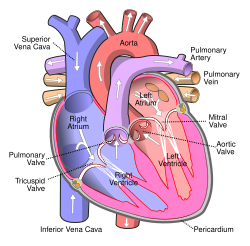Lutembacher's syndrome

Editor-In-Chief: Prab R Tumpati, MD
Obesity, Sleep & Internal medicine
Founder, WikiMD Wellnesspedia &
W8MD medical weight loss NYC and sleep center NYC
| Lutembacher's syndrome | |
|---|---|

| |
| Synonyms | |
| Pronounce | N/A |
| Specialty | N/A |
| Symptoms | Shortness of breath, fatigue, palpitations, cyanosis |
| Complications | Heart failure, pulmonary hypertension |
| Onset | |
| Duration | |
| Types | |
| Causes | Atrial septal defect, mitral stenosis |
| Risks | |
| Diagnosis | Echocardiography, cardiac catheterization |
| Differential diagnosis | |
| Prevention | |
| Treatment | Surgical repair, percutaneous intervention |
| Medication | Diuretics, beta blockers, anticoagulants |
| Prognosis | |
| Frequency | |
| Deaths | |



Lutembacher's syndrome is a rare medical condition characterized by a combination of mitral stenosis and atrial septal defect. It was first described by the French physician René Lutembacher in 1916.
Etiology[edit]
The etiology of Lutembacher's syndrome is not fully understood. It is believed to be a combination of congenital and acquired factors. The atrial septal defect is usually congenital, while the mitral stenosis is typically acquired, often as a result of rheumatic fever.
Clinical Presentation[edit]
Patients with Lutembacher's syndrome may present with symptoms of both right and left heart failure. These can include dyspnea, palpitations, fatigue, and edema. On physical examination, signs of mitral stenosis and atrial septal defect may be present, such as a loud first heart sound, a mid-diastolic murmur, and a fixed split second heart sound.
Diagnosis[edit]
The diagnosis of Lutembacher's syndrome is typically made based on the clinical presentation and confirmed with imaging studies. Echocardiography is the imaging modality of choice and can demonstrate both the atrial septal defect and mitral stenosis. Other diagnostic tests may include electrocardiography and cardiac catheterization.
Treatment[edit]
The treatment of Lutembacher's syndrome is aimed at managing the symptoms and preventing complications. This can include medications to control heart rate and rhythm, diuretics to manage fluid overload, and anticoagulation to prevent thromboembolic events. In some cases, surgical intervention may be necessary to repair the atrial septal defect and/or replace the mitral valve.
Prognosis[edit]
The prognosis of Lutembacher's syndrome is variable and depends on the severity of the mitral stenosis and atrial septal defect, as well as the patient's overall health. With appropriate treatment, many patients can lead a normal life.
See Also[edit]
Ad. Transform your life with W8MD's Budget GLP-1 injections from $75


W8MD offers a medical weight loss program to lose weight in Philadelphia. Our physician-supervised medical weight loss provides:
- Weight loss injections in NYC (generic and brand names):
- Zepbound / Mounjaro, Wegovy / Ozempic, Saxenda
- Most insurances accepted or discounted self-pay rates. We will obtain insurance prior authorizations if needed.
- Generic GLP1 weight loss injections from $75 for the starting dose.
- Also offer prescription weight loss medications including Phentermine, Qsymia, Diethylpropion, Contrave etc.
NYC weight loss doctor appointmentsNYC weight loss doctor appointments
Start your NYC weight loss journey today at our NYC medical weight loss and Philadelphia medical weight loss clinics.
- Call 718-946-5500 to lose weight in NYC or for medical weight loss in Philadelphia 215-676-2334.
- Tags:NYC medical weight loss, Philadelphia lose weight Zepbound NYC, Budget GLP1 weight loss injections, Wegovy Philadelphia, Wegovy NYC, Philadelphia medical weight loss, Brookly weight loss and Wegovy NYC
|
WikiMD's Wellness Encyclopedia |
| Let Food Be Thy Medicine Medicine Thy Food - Hippocrates |
Medical Disclaimer: WikiMD is not a substitute for professional medical advice. The information on WikiMD is provided as an information resource only, may be incorrect, outdated or misleading, and is not to be used or relied on for any diagnostic or treatment purposes. Please consult your health care provider before making any healthcare decisions or for guidance about a specific medical condition. WikiMD expressly disclaims responsibility, and shall have no liability, for any damages, loss, injury, or liability whatsoever suffered as a result of your reliance on the information contained in this site. By visiting this site you agree to the foregoing terms and conditions, which may from time to time be changed or supplemented by WikiMD. If you do not agree to the foregoing terms and conditions, you should not enter or use this site. See full disclaimer.
Credits:Most images are courtesy of Wikimedia commons, and templates, categories Wikipedia, licensed under CC BY SA or similar.
Translate this page: - East Asian
中文,
日本,
한국어,
South Asian
हिन्दी,
தமிழ்,
తెలుగు,
Urdu,
ಕನ್ನಡ,
Southeast Asian
Indonesian,
Vietnamese,
Thai,
မြန်မာဘာသာ,
বাংলা
European
español,
Deutsch,
français,
Greek,
português do Brasil,
polski,
română,
русский,
Nederlands,
norsk,
svenska,
suomi,
Italian
Middle Eastern & African
عربى,
Turkish,
Persian,
Hebrew,
Afrikaans,
isiZulu,
Kiswahili,
Other
Bulgarian,
Hungarian,
Czech,
Swedish,
മലയാളം,
मराठी,
ਪੰਜਾਬੀ,
ગુજરાતી,
Portuguese,
Ukrainian


